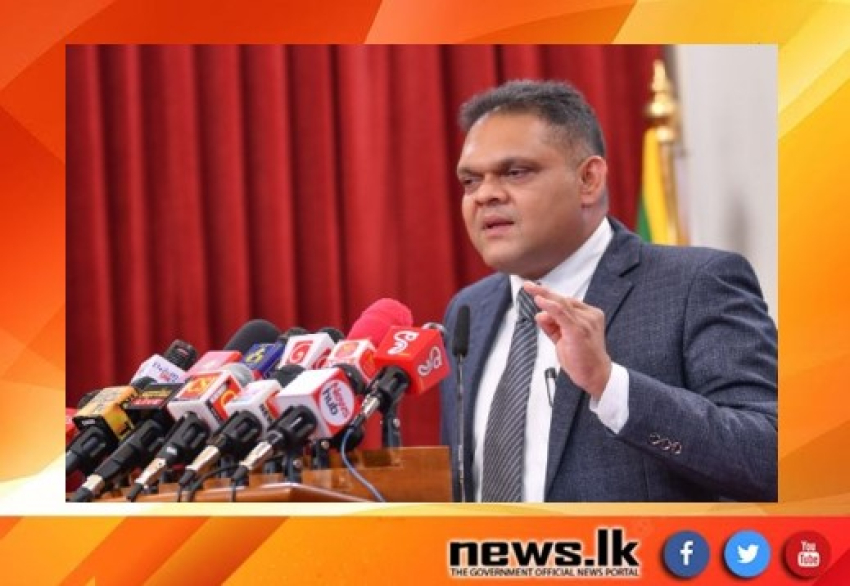State Minister for Finance Mr. Shehan Semasinghe declared that work on more than 200 development projects, initiated with foreign aid but halted midway, is set to recommence in the first quarter of the next year. Minister Semasinghe made this announcement in light of the bolstering of the country’s economy with the second tranche of the International Monetary Fund (IMF).
Speaking at a news conference held at the Presidential Media Centre (PMC) under the theme Collective path to a Stable Country,’yesterday (14) the State Minister of State emphasized the significance of political stability reflected in the passage of the 2024 budget proposal. He underscored that this year’s budget provides the necessary groundwork for effective management of state income and expenditures.
Minister Semasinghe, addressing the economic challenges faced by the country, pointed out that slogans alone are insufficient, advocating the necessity of the IMF program. He highlighted the successful passing of the 2024 state budget and the anticipated release of $337 million from the IMF as a positive development. He expressed hope for similar cooperation from the World Bank and the Asian Development Bank.
Pointing out that the country’s economy is not at a level where popular political slogans can be used to find solutions, the State Minister emphasized that there was no other option but the program with the International Monetary Fund.
State Minister Shehan Semasinghe further commented, stating that it was possible to pass the 2024 state budget, reflecting the political stability of the parliament. Additionally, he highlighted that the International Monetary Fund has decided to release the second instalment to Sri Lanka. Accordingly, as expected, the country is set to receive US $ 337 million from the IMF. Simultaneously, hopes are high for the release of the previously agreed instalments from the World Bank (WB) and the Asian Development Bank(ADB).
The opposition created anxiety among the people by suggesting that the government would not succeed in the debt restructuring process, creating a very unfortunate situation. If the debt restructuring process fails, we will be unable to achieve our desired economic goals. The success of these efforts will contribute significantly to improving the economic condition of the country.
The State Minister also said that just a few months ago, the country faced a challenging economic situation. Comparing the economic conditions then and now, it becomes evident that the International Monetary Fund played a crucial role in facilitating this success. Apart from that program, there had no other means to uplift the economy as a country
State Minister Semasinghe emphasized that during the implementation of the program with the IMF, the operational procedures of the country’s creditors and other multilateral financial facilities played a crucial role. Within the financial framework of the IMF, Sri Lanka’s efficiency and commitments held significant importance.
As a responsible government, it was not inclined to underestimate the difficulties faced by the people. However, the government acknowledged that if such decisions were not made, the country might find itself in a worse situation than the last economic crisis in the future.
He stated that it is noteworthy that the leadership provided by President Ranil Wickremesinghe in this brief period was crucial for managing these situations. Gratitude must be extended to the people for their involvement in the government’s reform process, despite its challenges.
In addition to the approval of the budget document in the parliament, there is a need to concentrate on increasing state income. The problematic situation arises from the fact that government revenue has not been adjusted to match the expenditure.
The agreement with the International Monetary Fund has faced strong criticism in Parliament. However, it must be acknowledged that the country’s economy is not at a level where political solutions can be found. Criticizing and blaming the past are not effective in solving the crisis. Opposition groups have opposed government decisions solely for the sake of popularity, requiring a decision on whether to continue as a bankrupt country or strengthen the gained momentum.
Without a change in the country’s tax policy, the government will struggle to achieve the desired state revenue. The previous governments neglected the tax system, contributing to the current predicament.
The President proposed strengthening the tax network through last year’s interim budget. As it did not yield the expected results, the necessary conditions for expanding the tax network were established in this year’s budget. Therefore, increasing government revenue and managing expenditures are crucial.
Furthermore, work on over 200 projects, initially halted due to foreign loan challenges, will resume in the first quarter of next year. Despite the economic challenges, the country is optimistic and exhibits signs of recovery.
Building the country’s economy cannot be solely approached from a political angle, as suggested by the opposition. Criticizing groups that didn’t shoulder responsibility during challenging times is unfair. Survey institutes should responsibly express their opinions on the country’s economy, especially considering the critical juncture. The press release from the International Monetary Fund emphasizes that misinformation is being disseminated for political purposes.
PMD




















